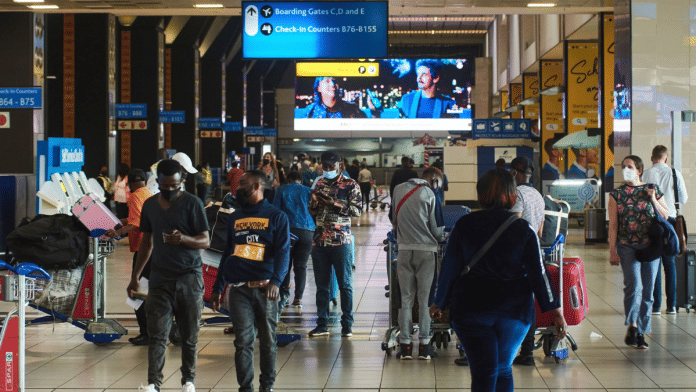United Nations/Geneva: Africa’s fourth pandemic wave, driven primarily by the Omicron variant, is flattening after a six-week surge, the WHO has said even as it stressed that the shortest-lived surge to date in the continent was “steep and brief but no less destabilising.” The new Omicron variant was first reported to the WHO from South Africa on November 24. The World Health Organisation (WHO) on November 26 declared it as a variant of concern.
“Early indications suggest that Africa’s fourth wave has been steep and brief but no less destabilising. The crucial pandemic countermeasure badly needed in Africa still stands, and that is rapidly and significantly increasing COVID-19 vaccinations. The next wave might not be so forgiving,” WHO Regional Director for Africa Dr. Matshidiso Moeti said.
In a statement issued on Thursday, the WHO said, “After a six-week surge, Africa’s fourth pandemic wave-driven primarily by the Omicron variant is flattening, marking the shortest-lived surge to date in the continent where cumulative cases have now exceeded 10 million.” WHO Director-General Tedros Adhanom Ghebreyesus voiced concern that even though more than 9.4 billion vaccine doses have now been administered globally, 90 countries did not reach the target of vaccinating 40 per cent of their populations by the end of last year, and 36 of those countries have not yet vaccinated 10% of their populations. More than 85 per cent of the population of Africa – about one billion people – is yet to receive a single dose of vaccine, he said. “We cannot end the acute phase of the pandemic unless we work together to close these gaps,” he said.
Last week, more than 15 million new cases of COVID-19 were reported to WHO from around the world – by far the most cases reported in a single week, with Ghebreyesus calling it an “underestimate.” “This huge spike in infections is being driven by the Omicron variant, which is rapidly replacing Delta in almost all countries.
As of January 11, there have been 10.2 million COVID-19 cases in Africa. Weekly cases plateaued in the seven days to January 9 from the week before. Southern Africa, which saw a huge increase in infections during the pandemic wave, recorded a 14 per cent decline in infections over the past week.
Also read: Covid has surged, but there are hardly any ‘black fungus’ cases this time — doctors explain why
South Africa, where the Omicron variant was first reported, saw a 9 per cent fall in weekly infections. East and Central Africa regions also experienced a drop. However, North and West Africa are witnessing a rise in cases, with North Africa reporting a 121 per cent increase this past week compared with the previous one, the WHO said.
Across the continent, though, deaths rose by 64 per cent in the seven days ending on January 9 compared with the week before mainly due to infections among people at high-risk. “Nonetheless, deaths in the fourth wave are lower than in the previous waves. Hospitalisations have remained low.” WHO said adding that in South Africa, around 9 per cent of its over 5,600 intensive care unit beds are currently occupied by COVID-19 patients. While the African continent appears to be weathering the latest pandemic wave, concerns remain over the low vaccination rates. Just around 10 per cent of Africa’s population has been fully vaccinated. However, vaccine supplies to the continent have improved recently, and WHO is stepping up its support to countries to effectively deliver the doses to the wider population.
“This year should mark a turning point in Africa’s COVID-19 vaccination drive. With vast swaths of the population still unvaccinated, our chances of limiting the emergence and impact of deadly variants are frighteningly slim,” Moeti said.
“We have the know-how and the tools and with a concerted push we can certainly tip the balance against the pandemic.” In countries experiencing a surge in cases, the fast-spreading Omicron variant has become the dominant type. While it took around four weeks for the Delta variant to surpass the previously dominant Beta, Omicron outpaced Delta within two weeks in the worst-hit African countries.
So far 30 African countries—and at least 142 globally—have detected the Omicron variant while the Delta variant has been reported in 42 countries in Africa. In West Africa where COVID-19 cases are on the rise, the number of Omicron sequences undertaken by countries including Cabo Verde, Ghana, Nigeria and Senegal is growing. In Cabo Verde and Nigeria, Omicron is currently the dominant variant. -PTI
This report is auto-generated from PTI news service. ThePrint holds no responsibility for its content.
Also read: India can handle 10-20 lakh cases daily, govt estimates based on Omicron hospitalisation trend






